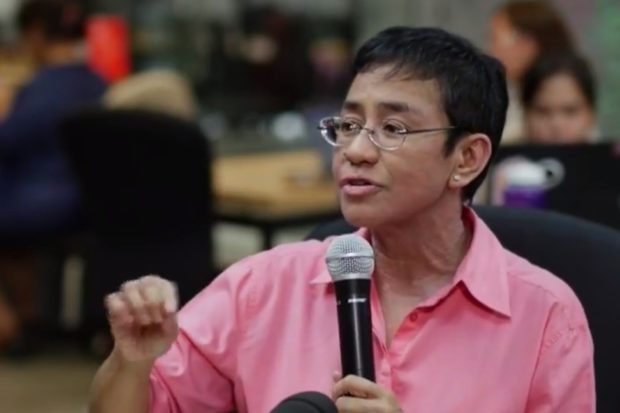
Rappler executive editor and CEO Maria Ressa. SCREEN GRAB FROM RAPPLER FACEBOOK LIVE
A few days after the Securities and Exchange Commission (SEC) revoked its license to operate, online news agency Rappler on Thursday received summons from the National Bureau of Investigation asking it to respond to a cybercrime complaint.
The NBI issued subpoenas dated Jan. 10 to Rappler chief executive officer Maria Ressa, former Rappler reporter Reynaldo Santos Jr. and businessman Benjamin Bitanga based on a complaint filed by businessman Wilfredo Keng who figured in a Rappler story in 2012. Neither the nature of the complaint, nor the date in which it was filed, were stated in the subpoena.
The new development, Ressa said, was “evidence that the attacks against Rappler (were) political in nature, from the SEC’s decision to the investigation of the Department of Justice and the NBI, to this new subpoena(s).”
But NBI cybercrime division chief Manuel Antonio Eduarte said the timing of the summons and the SEC decision was merely “coincidental.”
“The subpoenas stem from a completely different case,” Eduarte said, adding that he was “not at liberty to discuss the contents of the complaint yet.”
In 2012, at the height of the late Chief Justice Renato Corona’s impeachment trial, Rappler had published a report written by Santos which said that Keng had lent his black Chevrolet Suburban to the magistrate.
SEC ruling
The report said the SUV, which bore plate number ZWK 111, was registered under Keng based on records of the Land Transportation Office.
Keng admitted the plate number was his, but said he did not own the SUV that Corona had been using.
The NBI also summoned businessman Benjamin Bitanga who, it said, was also named in Keng’s complaint although the agency refused to divulge specifics.
Rappler said Bitanga was an incorporator of Dolphin Fire, a shareholder in Rappler Holdings. Bitanga’s son, James, sits on Rappler’s board.
The SEC on Monday canceled Rappler’s registration, saying the online news agency used “deception” to circumvent the Constitutional provision mandating 100-percent Filipino ownership of mass media, by accepting over $1 million (around P50 million) from a foreign investor in Philippine depository receipts (PDR).
PDRs are financial instruments that allow foreign entities to buy into private corporations for financial returns, without exercising any control in the company.
Ressa had described the SEC ruling as “harassment,” and accused Malacañang of being behind it because of the news agency’s highly critical reporting on the Duterte administration.
‘Fishing expedition’
Justice Secretary Vitaliano Aguirre II on Thursday defended his decision to order probes into Rappler.
“Rappler should welcome this investigation so that it will have the chance to prove the innocence it claims to have,” Aguirre said in a statement, responding to Rappler calling the investigation a “fishing expedition.”
The government has denied it was cracking down on journalists, and said Rappler broke the law by granting an American investor the power to have a say in its operations. Rappler has insisted this was not the case.
The Cybercrime Prevention Act was passed in 2012, but was described as “unconstitutional” by several groups, including media organizations.
In February 2014, the Supreme Court ruled the online libel provision of the act to be constitutional.